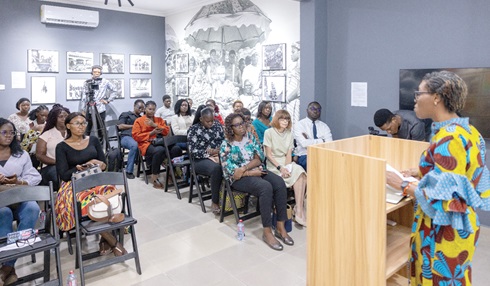A training programme aimed at addressing gender gaps in media leadership and representation has been launched in Accra.
The initiative, which is named HerPress and is the first specialised journalism programme for women in the country, will be offering an intensive three-month course to train 20 female journalists in advanced reporting, safety protocols and leadership development at a time.
The programme, which was organised by Dikan Centre, a non-governmental organisation that promotes African arts and heritage, and supported by the Australian High Commission in Ghana, seeks to tackle persistent challenges faced by women in the media industry, such as workplace harassment, unequal pay, and limited career advancement.
Participants will undergo mentorship and hands-on training in investigative journalism and digital storytelling while learning strategies to overcome the structural barriers in their profession.
It also aims to create a pipeline of female media leaders who will transform newsrooms and promote inclusive and balanced reporting.
Equality
The Programme Manager of the Central Leadership Programme, Ewurama Bennin, described the quest for equality as a fight against the “enemy within,” the internal doubts, fears and social narratives that would tell women they were not enough.
She outlined three pillars for personal transformation, which she mentioned as: knowing oneself with deep self-awareness, understanding how one's experiences shape identity, and embracing self-love through full acceptance.
Ms Bennin, therefore, urged women to reclaim their power through deliberate and strategic action.
"Actions speak louder than words, and your actions will make your voice heard," she stated, and emphasised the need for strategic self-advocacy over passive hope for recognition.
Media freedom
The Australian High Commissioner, Berenice Owen-Jones, stressed the commitment of her country to advancing gender equality and media freedom in Africa.
She said empowering women journalists and amplifying their voices would not only foster transparency in governance but also increase the likelihood of the truth being told.
"When women’s voices are amplified, governance is more transparent, and when women journalists are empowered, the truth is more likely to be told," she added and cited alarming disparities such as women constituting just 22 per cent of news sources across Africa and a mere six per cent of executive roles in Ghanaian media.
She said HerPress aimed to bridge that gap through targeted professional development.
Ms Owen-Jones further highlighted the threats that often silenced women journalists, from gender-based harassment to institutional discrimination and cautioned that such issues contributed to self-censorship and limited media diversity.
Reporting
For his part, the Founder and Executive Director of the Dikan Centre, Paul Ninson, said: “Journalism is not about reporting facts but about capturing the fullness of human experiences.
Mr Ninson said systemic issues, such as undervaluing the work of women, sexual harassment, and the marginalisation of their perspectives, hindered the ability of the media to tell the full story.
“When women’s contributions to storytelling are sidelined, journalism loses its power to reflect reality,” he said, adding that HerPress was aimed at reshaping the purpose of journalism, not only to inform but also to inspire and drive meaningful social transformation.
the— See more pictrues on page 24

